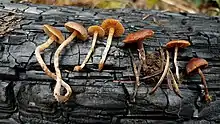Crassisporium
Crassisporium is a burn-inhabiting agaric fungal genus that colonizes forest fire and campfire sites on ground and charred woody debris in Europe, north Africa and western North America. The small brownish fruitbodies have broadly attached lamellae bordered by cheilocystidia and there is an absence of pleurocystidia and chrysocystidia. Spores are thick-walled, brown, smooth, and have a germ pore. The cap surface (pileipellis) is neither gelatinized nor cellular. Clamp connections are present in the hyphae. The genus is most closely related to the genus Romagnesiella and together both are nearest the Strophariaceae[1] or Cortinariaceae.[2] The generic name Crassisporium refers to the thick spore walls.
| Crassisporium | |
|---|---|
 | |
| Crassisporium funariophilum | |
| Scientific classification | |
| Kingdom: | |
| Division: | |
| Class: | |
| Order: | |
| Family: | |
| Genus: | Crassisporium Matheny, P.-A.Moreau & Vizzini (2014) |
| Type species | |
| Crassisporium funariophilum (M.M.Moser) Matheny, P.-A.Moreau & Vizzini (2014) | |
| Species | |
|
C. chilense | |
| Synonyms | |
See also
References
- Matheny PB, Moreau PA, Vizzini A, Harrower E, Haan AD, Contu M, Curti M (2014). "Crassisporium and Romagnesiella: two new genera of dark-spored Agaricales" (PDF). Systematics and Biodiversity. 13 (1): 28–41. doi:10.1080/14772000.2014.967823. hdl:2318/152675. S2CID 53694501.
- Vizzini A, Consiglio G, Marchett M (2019). "Mythicomycetaceae fam. nov. (Agaricineae, Agaricales) for accommodating the genera Mythicomyces and Stagnicola, and Simocybe parvispora reconsidered". Fungal Systematics and Evolution. 3: 41–56. doi:10.3114/fuse.2019.03.05. PMC 7235982. PMID 32467883.